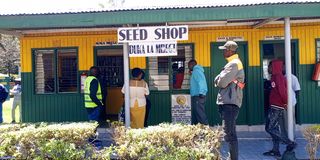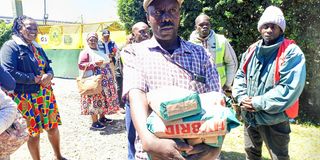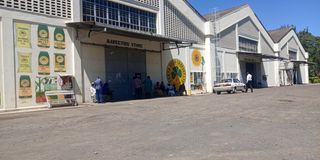Where are the maize seeds? Farmers in Nakuru decry seed crisis

Seed shop at the Kenya Seed Company - Nakuru depot where farmers buy their seeds.
Farmers in Nakuru have pointed an accusing finger at the government following a shortage of maize seeds at the Kenya Seed Company (KSC) - Nakuru depot.
Hundreds of them have been commuting to the depot daily in the hope of getting seeds, but to no avail.
Gladys Wangui, a resident of Gilgil, Mbaruk location says she has been travelling back and forth from Gilgil since Monday in an attempt to buy the 614 and 6213 maize seeds.

Gladys Wangui a farmers from Gilgil lamenting on the maize seed shortage at the Kenya Seed Company in Nakuru.
However, to her disappointment, she has not been able to get the required 20 packets of 2kg maize seeds that she needs to plant on her five acres of land and other plots.
"We have been informed that what is currently available in the shops is the 513 hybrid maize seed, which does not perform well in my region. I am reluctant to buy it. Some farmers in my region have decided to experiment with this variety. I myself cannot afford to do this because the money I earn from farming is used to educate my children," she says, explaining why it is important for her to get the right seed variety to plant.
Mrs Wangui goes on to say that she made the long journey to KSC after seeing cases of farmers buying fake seeds and not wanting to be counted. As a result, she has to part with Sh800 each time she travels to Nakuru.
So far, she has managed to get 10 packets of maize seed and is 10 packets short of getting enough maize seed for her farm.
Another farmer, Wycliffe Chandeka from Njoro, says he has been forced to take what is available (H 513) as his pockets are running dry from commuting to the facility in search of maize seeds.

Wycliffe Chandeka carrying five packets of hybrid 513 maize seeds purchased at the Kenya Seed Company in Nakuru.
"I heard an official at KSC say that this variety can grow in Njoro, so I decided to give it a try. I can no longer wait for the right type of seed and the rains are here. As a farmer, I feel aggrieved when a certified body that farmers have put their trust in fails us," Mr Chandeka said.
Surprisingly, those coming from as far as Kuresoi have been forced to stay in motels as they wait to collect enough maize seed before travelling back home.

Doors shut at Kenya Seed Company in Nakuru as the facility faces a shortage of maize seeds.
An official from the Kenya Seed Company, who requested anonymity, says the reason for this challenge is that demand for maize seed has been high this year, while supply has been low.
He links this to the availability of subsidised fertilizer from the government, which is now allowing farmers to plant more, and the emergence of counterfeit seeds flooding the market.
However, he is quick to point out that the rationing of the number of seeds per farmer was very deliberate, as they found that there were unscrupulous traders who posed as farmers only to buy in bulk for resale.
"We have three modes of supply, that's our branches across the country, agents and stockists. However, we noticed that some people came and bought the maize from us at a retail price of Sh420 and doubled the price while reselling it at a cost of between Sh900 and Sh1200, taking advantage of farmers who cannot get KSC to make their purchases," they said.
As a result, the purchase of maize was capped at five packets in order to stop the fishy business that had begun to take root in the supply system.
In this regard farmers have been urged not to be picky, as they believe that one variety is more productive than another.
"To some extent, I would say there is a misconception among some farmers. They are convinced that only one type of seed will work in the region and when you try to advise them on an alternative option, they are adamant on their choice. This has led to pressure on the numbers of a particular seed variety, especially 6213 maize seed, as it is a high performer."
The official assured the farmers that more seeds would be unloaded at the depot on April 18 and that they would be distributed.

